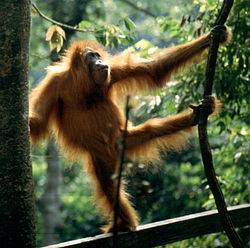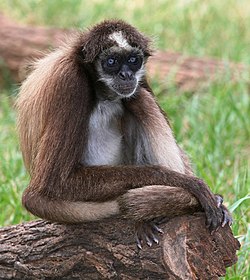Portal:Primates
The Primates Portal A primate is a member of the biological order Primates, the group that contains lemurs, the aye-aye, lorisids, galagos, tarsiers, monkeys, and apes, with the last category including great apes. With the exception of humans, who inhabit every continent on Earth, most primates live in tropical or subtropical regions of the Americas, Africa and Asia. Primates range in size from the 30-gram (1 oz) pygmy mouse lemur to the 200-kilogram (440 lb) mountain gorilla. According to fossil evidence, the primitive ancestors of primates may have existed in the late Cretaceous period around 65 mya (million years ago), and the oldest known primate is the Late Paleocene Plesiadapis, c. 55–58 mya. Molecular clock studies suggest that the primate branch may be even older, originating in the mid-Cretaceous period around 85 mya. Primates exhibit a wide range of characteristics. Some primates do not live primarily in trees, but all species possess adaptations for climbing trees. Locomotion techniques used include leaping from tree to tree, walking on two or four limbs, knuckle-walking, and swinging between branches of trees (known as brachiation). Primates are characterized by their large brains relative to other mammals. These features are most significant in monkeys and apes, and noticeably less so in lorises and lemurs. Many species are sexually dimorphic, which means males and females have different physical traits, including body mass, canine tooth size, and coloration.
Selected articleLemurs of Madagascar, currently in its third edition, is a reference work and field guide for the lemurs of Madagascar, giving descriptions and biogeographic data for the known species. The primary contributor is Russell Mittermeier, president of Conservation International, and the cover art and illustrations were drawn by Stephen D. Nash. The book provides details about all known lemur species, general information about lemurs and their history, and also helps travelers identify species they may encounter. Four related pocket field guides have also been released, containing color illustrations of each species, miniature range maps, and species checklists. The first edition was reviewed favorably in the International Journal of Primatology, Conservation Biology, and Lemur News. Reviewers, including Alison Jolly, praised the book for its meticulous coverage of each species, numerous high-quality illustrations, and engaging discussion of lemur topics, including conservation, evolution, and the recently extinct subfossil lemurs. Each agreed that the book was an excellent resource for a wide audience, including ecotourists and lemur researchers. A lengthy review of the second edition was published in the American Journal of Primatology, where it received similar favorable comments, plus praise for its updates and enhancements. The third edition was reviewed favorably in Lemur News; the reviewer praised the expanded content of the book, but was concerned that the edition was not as portable as its predecessors. The first edition identified 50 lemur species and subspecies, compared to 71 in the second edition and 101 in the third. The taxonomy promoted by these books has been questioned by researchers, such as Ian Tattersall, who view these growing numbers of lemur species as insufficiently justified inflation of species numbers (taxonomic inflation). Selected picture The brown spider monkey, Ateles hybridus, is a species of spider monkey, a type of New World monkey, from South America. It is found in Colombia and Venezuela. Like all spider monkeys, it has very long, spindly limbs and a lengthy prehensile tail which can almost be called a fifth limb. The tail is made up of highly flexible, hairless tips with skin grooves which improves grip on tree branches and is adapted to its strictly arboreal lifestyle. It is currently critically endangered, with few examples of them remaining in the wild. CategoriesSelected species Extinct (IUCN 3.1)|Extinct Afrasia djijidae is a fossil primate that lived in Myanmar approximately 37 million years ago, during the late middle Eocene. The only species in the genus Afrasia, it was a small primate, estimated to weigh around 100 grams (3.5 oz). Despite the significant geographic distance between them, Afrasia is thought to be closely related to Afrotarsius, an enigmatic fossil found in Libya and Egypt that dates to 38–39 million years ago. If this relationship is correct, it suggests that early simians (a related group or clade consisting of monkeys, apes, and humans) dispersed from Asia to Africa during the middle Eocene and would add further support to the hypothesis that the first simians evolved in Asia, not Africa. Neither Afrasia nor Afrotarsius, which together form the family Afrotarsiidae, is considered ancestral to living simians, but they are part of a side branch or stem group known as eosimiiforms. Afrasia is known from four isolated molar teeth (shown above) found in the Pondaung Formation of Myanmar. These teeth are similar to those of Afrotarsius and Eosimiidae, and differ only in details of the chewing surface. In the Pondaung Formation, Afrasia was part of a diverse primate community that also includes the eosimiid Bahinia and members of the families Amphipithecidae and Sivaladapidae. Did you know?
Primate lists
WikiProjectsThings to do
Associated WikimediaDiscover Wikipedia using portals
|






